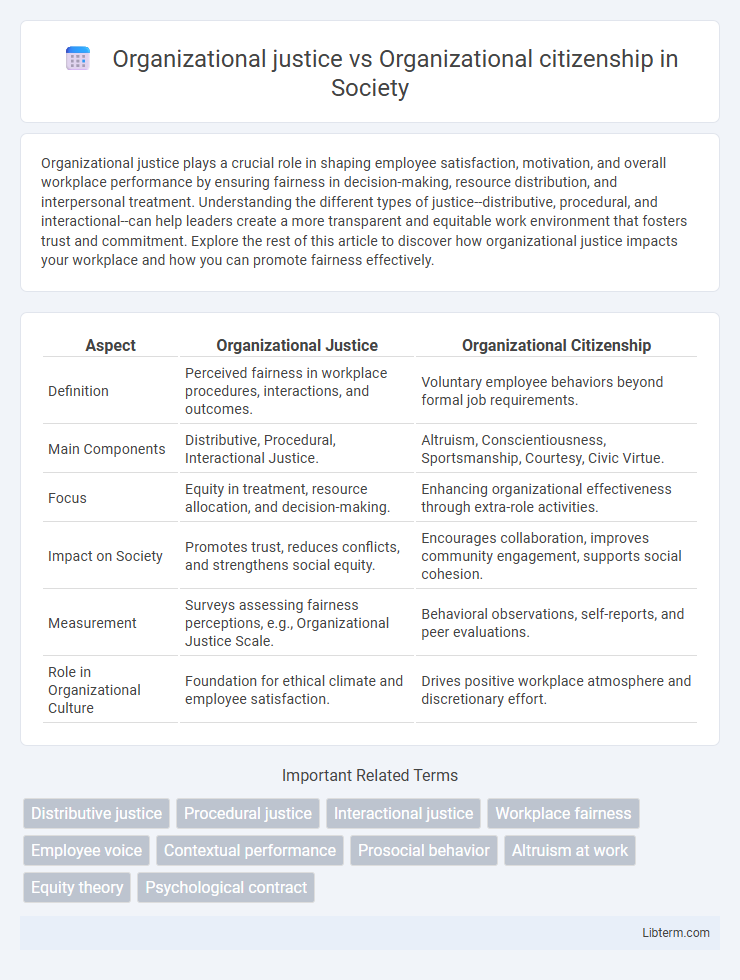Organizational justice plays a crucial role in shaping employee satisfaction, motivation, and overall workplace performance by ensuring fairness in decision-making, resource distribution, and interpersonal treatment. Understanding the different types of justice--distributive, procedural, and interactional--can help leaders create a more transparent and equitable work environment that fosters trust and commitment. Explore the rest of this article to discover how organizational justice impacts your workplace and how you can promote fairness effectively.
Table of Comparison
| Aspect | Organizational Justice | Organizational Citizenship |
|---|---|---|
| Definition | Perceived fairness in workplace procedures, interactions, and outcomes. | Voluntary employee behaviors beyond formal job requirements. |
| Main Components | Distributive, Procedural, Interactional Justice. | Altruism, Conscientiousness, Sportsmanship, Courtesy, Civic Virtue. |
| Focus | Equity in treatment, resource allocation, and decision-making. | Enhancing organizational effectiveness through extra-role activities. |
| Impact on Society | Promotes trust, reduces conflicts, and strengthens social equity. | Encourages collaboration, improves community engagement, supports social cohesion. |
| Measurement | Surveys assessing fairness perceptions, e.g., Organizational Justice Scale. | Behavioral observations, self-reports, and peer evaluations. |
| Role in Organizational Culture | Foundation for ethical climate and employee satisfaction. | Drives positive workplace atmosphere and discretionary effort. |
Defining Organizational Justice
Organizational justice refers to employees' perceptions of fairness in workplace procedures, interactions, and outcomes, encompassing distributive, procedural, and interactional justice dimensions. It influences employee attitudes, motivation, and behavior, shaping their willingness to engage in Organizational Citizenship Behavior (OCB), which involves discretionary actions beyond formal job requirements. Understanding organizational justice is crucial for fostering a positive work environment that promotes voluntary commitment and improves overall organizational effectiveness.
Understanding Organizational Citizenship
Organizational citizenship refers to discretionary employee behaviors that go beyond formal job requirements, enhancing organizational effectiveness without direct rewards. Understanding organizational citizenship involves recognizing how factors like organizational justice--fair treatment in decision-making, resource distribution, and interpersonal interactions--promote these voluntary contributions. High perceptions of organizational justice increase employees' willingness to engage in citizenship behaviors, improving overall workplace cohesion and performance.
Key Dimensions of Organizational Justice
Organizational justice encompasses distributive, procedural, interpersonal, and informational justice, which collectively influence employees' fairness perceptions regarding resource allocation, decision-making processes, respectful treatment, and transparent communication. These fairness dimensions significantly impact organizational citizenship behavior (OCB), motivating employees to engage in voluntary, extra-role activities that support organizational effectiveness. Understanding and enhancing key dimensions of organizational justice fosters a positive workplace climate, increasing employee commitment and discretionary efforts beyond formal job requirements.
Core Elements of Organizational Citizenship Behavior
Organizational citizenship behavior (OCB) encompasses voluntary actions beyond formal job requirements, including altruism, conscientiousness, sportsmanship, courtesy, and civic virtue, which promote organizational effectiveness. Organizational justice, referring to employees' perceptions of fairness in procedures, distribution, and interpersonal treatment, significantly influences the frequency and quality of OCB. Core elements such as conscientiousness reflect adherence to organizational norms, while altruism and courtesy enhance interpersonal relations, collectively fostering a cooperative and productive workplace environment.
Differences Between Organizational Justice and Citizenship
Organizational justice refers to employees' perceptions of fairness in workplace processes, interactions, and outcomes, while organizational citizenship involves voluntary, discretionary behaviors that go beyond formal job requirements to benefit the organization. The primary difference lies in organizational justice being a cognitive evaluation of fairness, influencing attitudes and job satisfaction, whereas organizational citizenship is behavioral, impacting overall organizational effectiveness and cooperation. Understanding these distinctions helps managers foster fair environments that encourage citizenship behaviors, enhancing both employee morale and organizational performance.
The Impact of Justice on Employee Citizenship
Perceptions of organizational justice significantly influence employee organizational citizenship behaviors (OCB), which are discretionary actions that benefit the workplace. When employees perceive fairness in distributive, procedural, and interactional justice, they are more likely to engage in altruistic behaviors, show increased cooperation, and exhibit higher commitment to organizational goals. Research indicates that a strong sense of justice fosters positive social exchanges, enhancing voluntary citizenship behaviors that improve overall organizational effectiveness and climate.
The Role of Leadership in Promoting Justice and Citizenship
Leadership plays a critical role in fostering organizational justice by establishing transparent policies and equitable treatment that enhance employees' trust and commitment. Effective leaders encourage organizational citizenship behaviors by modeling ethical conduct, recognizing employee contributions, and promoting a supportive work environment that motivates voluntary extra-role participation. Empirical studies demonstrate that transformational leadership significantly boosts perceptions of fairness and citizenship, leading to improved organizational performance and employee well-being.
Organizational Justice and Its Effect on Workplace Morale
Organizational justice, encompassing distributive, procedural, and interactional fairness, significantly influences workplace morale by fostering trust and commitment among employees. High levels of perceived organizational justice reduce turnover intentions and increase job satisfaction, leading to enhanced employee engagement and productivity. When employees believe their organization acts fairly, they are more likely to exhibit positive behaviors such as organizational citizenship, which further strengthens overall morale and workplace harmony.
Encouraging Citizenship Behaviors Through Fair Practices
Organizational justice, which encompasses distributive, procedural, and interactional fairness, plays a crucial role in encouraging organizational citizenship behaviors (OCBs) by fostering trust and commitment among employees. Fair practices in performance evaluation, resource allocation, and transparent decision-making processes boost employees' willingness to go beyond their formal roles, contributing positively to team cooperation and organizational effectiveness. Research demonstrates that perceptions of fairness directly correlate with increased voluntary behaviors that support organizational goals and interpersonal harmony.
Integrating Justice and Citizenship for Organizational Success
Integrating organizational justice and citizenship behaviors enhances overall organizational success by fostering trust, commitment, and cooperation among employees. Perceptions of fairness in distribution, procedures, and interpersonal treatment lead to increased voluntary actions that go beyond formal job requirements, promoting a positive work environment. This synergy between justice and citizenship boosts performance, reduces turnover, and strengthens organizational resilience.
Organizational justice Infographic

 libterm.com
libterm.com